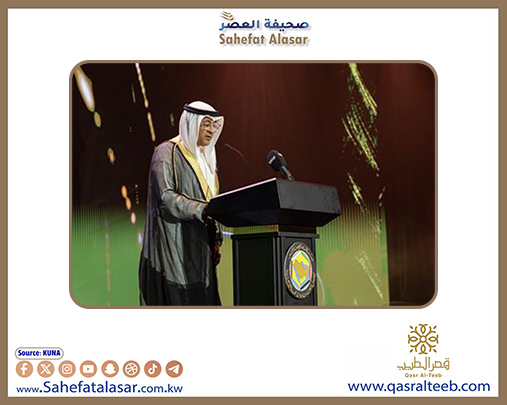


The Secretary-General of the Gulf Cooperation Council (GCC), Jasem Al-Budaiwi, stated that the 44th anniversary of the Council's establishment represents "a precious occasion embodying a journey full of Gulf achievements," praising the pioneering role of the founding leaders who laid the foundations of this distinguished Gulf entity.
The remarks came during Al-Budaiwi's speech at the anniversary celebration organized by the GCC General Secretariat at its headquarters in Riyadh on Saturday, attended by Riyadh Governor Prince Faisal bin Bandar bin Abdulaziz, Kuwait's Minister of Information and Culture and Minister of State for Youth Affairs Abdulrahman Al-Mutairi (representing the current presidency), along with ambassadors, diplomatic representatives, and senior officials.
Al-Budaiwi added that this occasion celebrates a blessed Gulf journey that began on May 25, 1981, and has strengthened bonds of unity, integration, and cooperation among GCC states and their peoples.
He affirmed that "thanks to the leaders' vision and commitment, the GCC has become a model for regional and international cooperation," noting that past years witnessed qualitative achievements and bright milestones across political, economic, social, and developmental fields.
The Secretary-General highlighted the GCC's growing regional and international influence, reflected in recent summits with the EU, United States, and upcoming summits with ASEAN and China, plus 15 ministerial meetings with other nations and groups - demonstrating the Council's pivotal international role.
Economically, Al-Budaiwi noted GCC states made qualitative leaps with a combined GDP of $2.1 trillion (ranking 11th globally) and per capita income averaging $36,800, projecting 4.5% economic growth in 2025 and 3.3% non-oil sector growth.
"GCC financial markets now rank among the world's largest, representing over 4.3% of global market value," he said, adding that intra-GCC trade grew 67% to $131.6 billion, while cross-border listed companies reached $520.4 billion in capitalization.
In energy, GCC states became leading renewable energy producers in the Middle East, contributing 30% of the region's clean energy and 54.5% of wind power (equivalent to 30% of global production).
Educationally, about 12,800 GCC students study in other member states' universities, reflecting educational integration and talent exchange.
Al-Budaiwi confirmed GCC readiness for digital economy adoption, with AI preparedness exceeding global averages. Digital sectors are projected to contribute 34% to GCC GDP by 2030.
He announced joint digital initiatives including a GCC news agency app and a Gulf statistics smartphone app providing accurate development indicators.
The Secretary-General praised GCC states' support for women and youth, citing "Inspiring Gulf Woman" (International Women's Day) and "Gulf Youth Day" celebrations honoring their achievements.
Concluding, Al-Budaiwi expressed gratitude for member states' support, particularly Kuwait's current presidency, and prayed for continued GCC security, stability, and prosperity in their joint journey.
